#but also it works on its own merits
Text
I know we have the word "nationalize", but really, the opposite of "privatize" should be "generalize".
6 notes
·
View notes
Text

sorry these kinds of comments have been really pissing me off recently lol
#it's been kinda hard for me to pinpoint WHY exactly these sort of comments feel insulting#but i think it's mostly because it implies my original work is purposefully and inherently derivative of things i have no connection to#while i think being derivative in art is. kinda unavoidable in a sense (and something i'm aware i do consciously and unconsciously)#it feels like a slap in the face when people imply that my work cannot hold its own merit and need to be compared to#something in the popular conscious#and like sometimes people don't know it's original art which is fine#but it also doesn't hurt to ask if it's original instead of just. immediately assuming or comparing it to something else#i know this will only get more difficult as i continue to drift away from fanart and fan works#but i really want to be able to be proud of my original work and i want to share more! because it's a part of me!!#but its really hard when it feels like i'm always going to be compared to things people care about more!!!! AAAUGH#god. ok sorry i need to get that off my chest. if anyone compares computer angel to TMA again im gonna start eating drywall#fern's sketchbook
817 notes
·
View notes
Text
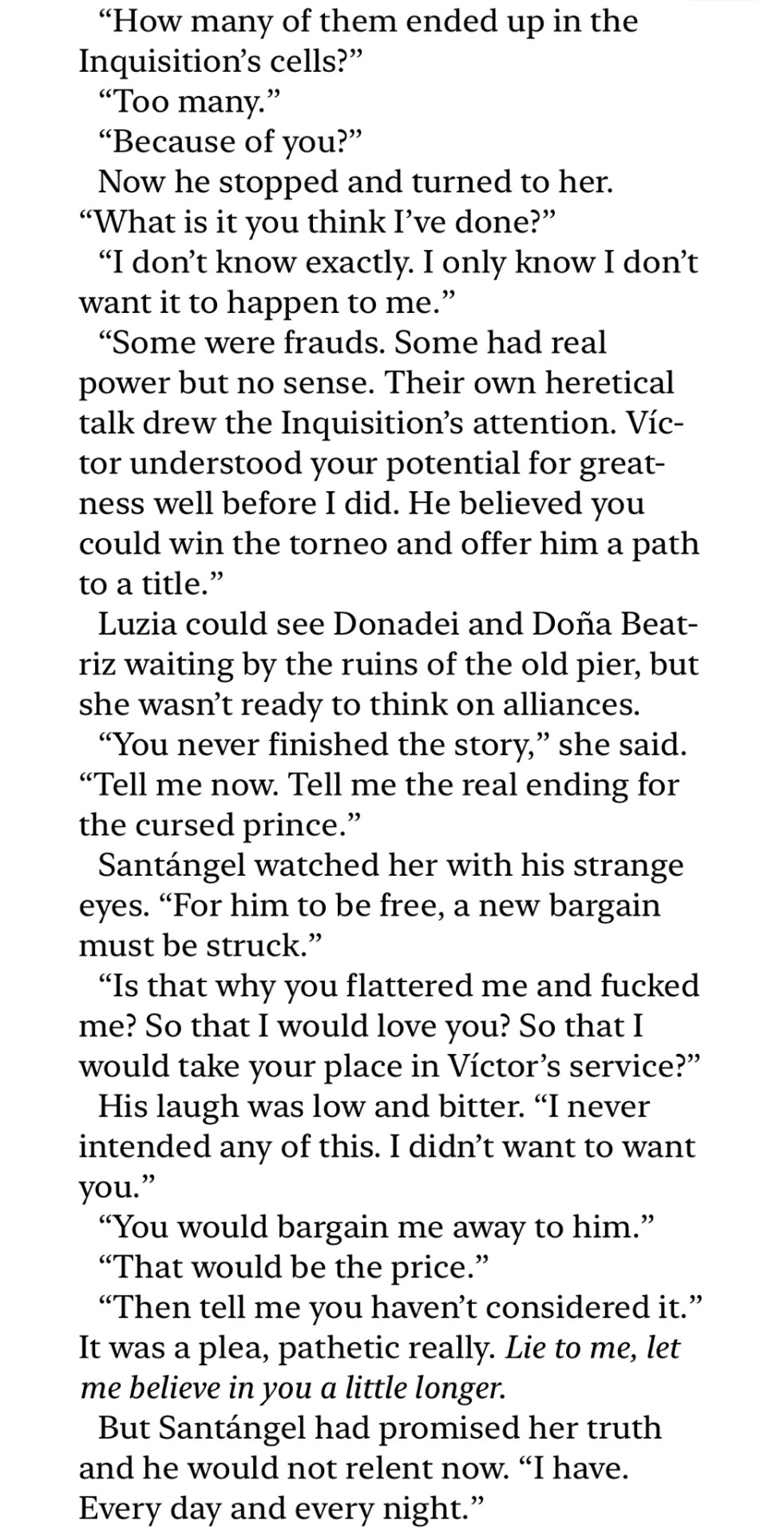
Leigh Bardugo write a new dynamic challenge: failed spectacularly
#this is SO funny??? what is HAPPENING#the familiar#the familiar spoilers#she’s written transparent fanfiction of her own work but unfortunately like most fanfic#it does not entirely function as a stand alone story on its own merits#so far my feelings on this are: it is simultaneously much more competent than S&B but also fundamentally less interesting rip
31 notes
·
View notes
Text
*wakes up in a cold sweat* obviously the guardian is an echo of the emperor's claim to being an adventurer bearing the burden of saving a wicked world..... (a pretense/a performance/an experiment to a means to an end)
but i can't stop laughing bc like. Tha. That's the emperor's OC. the dream visitor is his OC that he's shipping with tav. and let me tell you the fic is 300k
#I CANT STOP LAUGHING AT THIS#bg3 spoilers#he made a blorbo he knew you would like....#btw imo the guardian has its own merits in the emperor's ties to humanity / he's puppeting it detached at some story beats yes but#there's definitely more to it. as someone who was also infected with a tadpole and has the trauma of that.#even if it doesn't feel like trauma anymore bc of how illithid processing works like.. he still has intelligent recognition of loss +#isolation etc etc so i definitely entertain the idea that TO SOME EXTENT the guardian does something for him too.#regardless of what you want to argue that 'smth' is its too extensive/cinematic. he could manipulated u in 1000 other ways. instead#he chose t-. 🤺 🤺🤺🤺🤺 hi 🤺🤺🤺🤺 i'm going now#🦑.txt#s: i am still dreaming of kissing your claws
53 notes
·
View notes
Text
yeah yeah i got recommended that Henry Cooldown analysis video whatever. i am still not over people comparing Henry to a medieval knight, NOT even taking the time to unpack that said mental image of a knight is 'mostly' associated with the British Monarchy*, an extension of its Empire that *checks notes* did a long list of atrocities like imperialism and colonialism, and also (multiple) genocides.
Henry is NOT British, he is Irish. Although considering the history of Ireland and how poorly the British Empire has treated them (amongst SO MANY OTHER COUNTRIES AND DIASPORAS), yeah it's NOT surprising that an Irish man like Henry is essentially forced to adopt quote on quote 'British sensibilities' to 'survive'. <- intentional imagery or not, the implications are not lost on me.
Like okay, calling out the comparison is cool but it sure would be nice if people went further to unpack what that means and implies in the long term. you know, like ACTUAL CRITICAL ANALYSIS?!
#I COULD do a whole essay about this. but i don't have the spoons to do so.#this is were i drop the big ball of information about me because fun fact! I am IRISH AND SCOTTISH. AND GREEK. so like.#so yeah i REALLY don't like the british#i hope in alternate universe i make youtube video essays about no more heroes and successfully argue how its about inter-generational traum#shallow rambles#nomoreposting#technically I was quite surprised by being recommended it. but looking at the comments i realised that their interpretation#is like the buy the books obvious surface level analysis of henry's character. not actually. thinking about the deeper things#behind his character. like. are we really going to ignore how his memories were wiped when he was adopted? okay.#to me henry is an example of someone finally confronting their trauma. how they cope is a whole other thing but henry is second#to jeane (the sister) that actually takes the time to confront the trauma although unfortunately this is mostly implied off-screen#travis BARELY acknowledges how fucked up it was for him and his siblings to be split apart and raised by different families#this got really fucking personal and i don't think anyone has actually cared enough to even consider the historical subtext#of these characters but that's just my take.#also i'm not fucking listening to a man explain to me what henry is. you know in a filmbro way. i have my own brain and interpretation and#that is all that matters to me. if you liked the guys video that's fine but honestly i am just not that interested in the essay.#you like henry for the rivalry trope. I like henry for other reasons that are open ended. we are NOT the same.#btw not EVERYTHING is about kill the past. it feels so reductive to ONLY analyse suda's work as a connected series#because it implies each one can't stand on their own merits!! that's NOT good analysis!! his work can stand on their own individually!#*about the whole knight and british monarchy thing there are other knights in other countries but unfortunately we only#think about knights in a VERY british-centric way. just thought to bring that up.#no i wont make a video essay about any of this i value my anonymity.#no i won't apologise for waking up and choosing violence today
7 notes
·
View notes
Text
overall enjoyed fiona and cake. plot lost me a little in the middle (i think i’m becoming tired of multiverse stories, even though this was a rather charming version) but thematic material was just gutting. samira was there too
#pers#you have to put art out into the world in order for it to be real but also to do so will change it irrevocably and you too#like sure. fine. ok!#it was fun to see the iterations and explorations of that theme in each universe#the winter king who is able to create something beautiful while remaining sane bc of putting the burden on someone else#the lich getting what he wanted and living in a literally empty world#the way that simon was going into the caspar and nova story looking for a specific thing for the work to do something for him#and being unable to meet it on its own terms or merits. like idk. idk that was REALLY interesting. AND ALSO SICKENING.
7 notes
·
View notes
Text
it's crazy to go to a gallery and see truly mediocre work being sold for hundreds of dollars and then come on here and see someone selling a stunning, vibrant, skillfully executed, meticulously detailed original piece for double digits
#shouting you are selling that piece for what one nice print of it is worth!! charge three to six times as much right now!!!!!!!!!!!!!!!!!#selling prints for $4 on their kofi im gonna be sick. PLEASE make yourself some MONEY!!! your work is worth more than that!!!!!!!!!!!!#.txt#also not hating on the gallery pieces. i also make mediocre work. and you know what if someone else can have the audacity to sell their#soso line drawing with eraser marks for $400 so can i. really it's inspiring. but the degree to which artists that come up in online spaces#devalue their own work is so so chilling and sad really actually. idk maybe they're making money by making it accessible#and that is cool on its own merits but like christ above you should pay yourself more than pennies
4 notes
·
View notes
Text
The Stanley Parable: Ultra Deluxe screengrabs
‼️ SPOILER WARNING ‼️
Alright so the first few are just from replaying all the stuff that was in the HD Remix, just to see some of the texture differences, but I also took some screengrabs just because they’re fun!

I’m so glad this one made it in lol (he is)
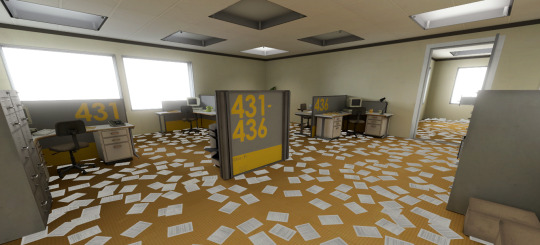
I got the paper office! :D

And the whiteboard ending!! Yes!!! Dog mode is terrible though haha ♪
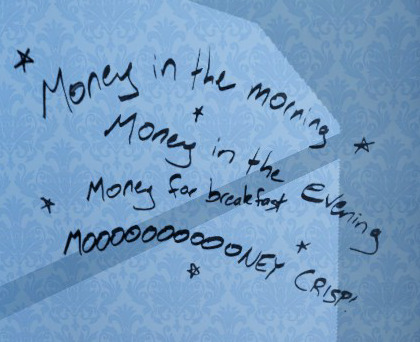
Spamtoncore
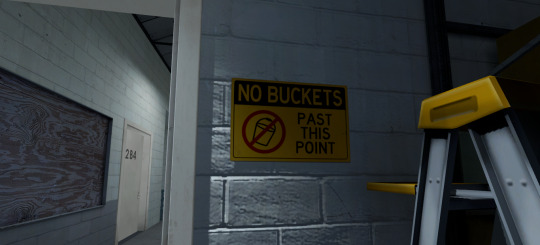
This was new! I knew about the Bucket but I hadn’t met them yet so I was just like Hmmm Hmmm Interesting haha
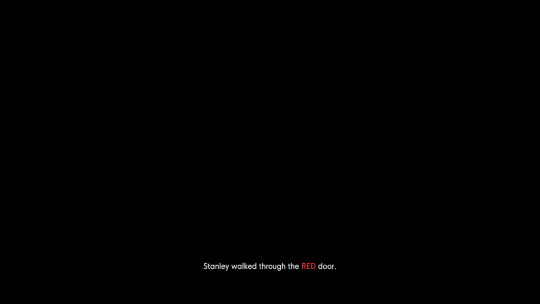
Fall through the floor Part 2 - luckily this was the last one of the initial play session! Still though, load your rooms pls
Alright from here it’s all Ultra Deluxe so watch out!

I want this. Sadge that it’s sold out </3

I just got this one! :D
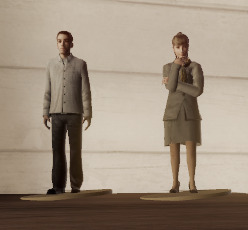
They!!! So tiny <3 It’s nice to see Mariella’s model as well, I’ve seen Stanley’s a few times but never Mariella from the front!

Just played with this one too, the grandfather <3

Who is this!!! They’re so cute what!!!

This image is probably especially funny to me because it reminds me of a meme I made lol

Hi Stanley, Hi Stanley, haha ♪

There he is. The Narrator turned him into a marketable figure

Very cursed Stanley smile :) He deserves it
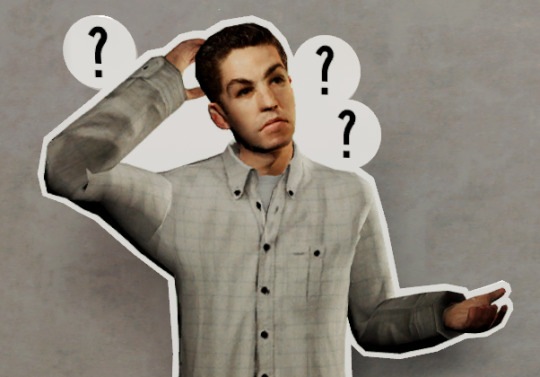
Me

See, this dark, infinite abyss makes sense! It all ties together! Brilliance in writing! Lol

My previous point (also implying that Stanley is normal, really, Narrator, you should know better by now)

I appreciate the serial code(?) nameplate lol - this whole section was too strange haha

*heavy breathing* I mean literally what more could I ask for (I did also like the Stanley Parable concept art though haha, and the pause button stuff)

I gotta be honest, I was not sold on this bucket at first, but after this-

EEE, even better!! Yes, I’m onboard on the bucket now, I love Bucket
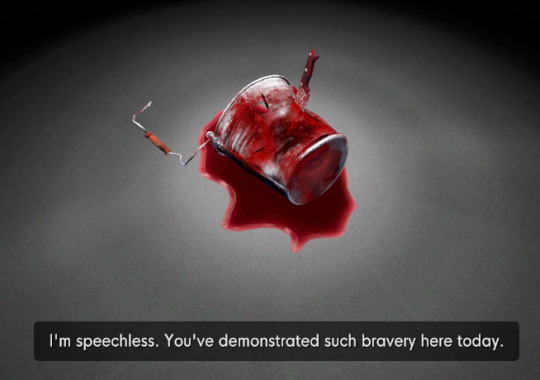
There is an awful lot of Bucket death in this game huh. Like, Stanley dies a lot too, but we don’t get to see that usually, so it’s oddly visceral
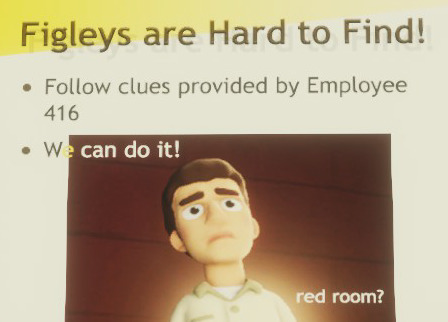
Employee 416 you say 👀 So there was somebody in there initially, until they were moved...? (I like to imagine they also drew the little Stanlurine doodle on the whiteboard lol)

I forgot that this was flagged by the phone call lol, I wonder if anybody has actually counted them
That’s all for this playthrough! If I fall through the floor again, I’ll try to catch it!
#The Stanley Parable#The Stanley Parable Ultra Deluxe#WPTSP#Blood#There will also be spoilers in the tags so be warned! Haha#Don't mind the weird cropping on some of these I was trying to work around my little Windows watermark as best I could#At least before I remembered/paid attention to how to screenshot using the Steam overlay anyhow lol#The Bucket did not fare so well ah well it's charming enough on its own merit lol#I had a lot of fun little happenings that don't really communicate in screenshots ah#Like playing the 2: Escape Pod and 2: Mariella endings back to back (with an interstitial waiting period for the Bucket lol)#Being called a dork (<3) and a dolt (<3 <3) by the Narrator (<3 <3 <3)#And the updated Games ending for this version! Ah!! He's so bratty!! What a delight#And the differences in ''endings'' down the vent if you bring Bucket or not and the Narrator ''disproving'' some fanon#Tbf I don't think most people actually thought he was like Just a recording but rather the aesthetic of him literally Being a cassette deck#Like the monitor head! It's all good! All of it!! He's a strong aesthetic man <3#Also saw?? Alex Hirsch in the credits sorry?? Was he the cassette man voice or? I don't know where else he might've been#And the Curator was mean in 2: Museum!! Bucket really brings out the worst in people ♪#I can't tell if it's just because I was losing steam by that point but the only one I was kinda meh on was 2: Real Person#Retrofitting one of the best endings is always a tall task tho :P And I still prefer the HD Remix's version of the Real Person ending anyhow#Even the glitching was a little lackluster :0 The timing was a little off#But :) I still have the HD Remix if I ever want to experience it my favourite way hehe ♪ The more the merrier!#Now for some stress tests >:3c Gonna go back in and see just how many ways I can mess up the game ♪♫#WPVG
11 notes
·
View notes
Text
this might be saccharine or whatever but truly the human voice is such a beautiful instrument. the way one naturally sands it down through practice - literally, training your throat, jaw, diaphragm, tongue, lips - to achieve a sound that is uniquely you. and the thing I derive most joy from, I think, is that you cannot sand it down to nothing. it simply becomes more refined, it grows and changes as you do and I am honestly grateful that I chose to hone my own individual instrument and got to experience this journey. it also gives me an acute sense of awe and appreciation for all the voices I've had the pleasure of experiencing in my life; both speaking voices and vocalists alike
(& special shoutout to trans voices which are literal asmr to my ears ✊)
#getting close to being confident enuf to post my vocals lmao#alex.txt#also this musing spurred a thought about the power of self gratitude#its probably its own post but basically the jist is#we dont rly properly praise or congratulate ourselves for doing hard inner work i think.#you hear a lot about 'treating yoself' or rewarding urself materially#i do it too.#there is merit in it.#but#at least to me#there seems to be a different kind of power/strength in simply looking yourself in the eye and saying thank you.#thank you for caring enough#for loving yourself enough#to have done this for us. thank you.
3 notes
·
View notes
Text
Currently getting my socks clean blown off by Rethinking Narcissism, by Dr. Craig Malkin. Which I found, in a roundabout way, from this video on Midsommar, grief, and narcissism.
Tonight I woke up from a nap and accidentally took my morning meds, so I'm going to be up for a few hours because of the meth. In place of sleep, I'll try to roughly sum up some basic ideas proposed by the research the book is based on:
That traits of "narcissism" like entitlement, grandiosity, and feeling special are not inherently toxic. There are times and places they are appropriate and beneficial. If you show up at a hospital with a gunshot wound to the chest, you should not sit and wait to be seen after people with earaches and coughs.
(Actually, medical systems are designed to prioritize people with more urgent needs, and you qualify under that system. You are special and are deserving of different treatment than those others, which is why making your needs known, even insisting on it if you're not listened to appropriately the first time, is an extremely good idea. It keeps you from bleeding to death on the floor, and keeps the hospital from getting its pants sued off by your heirs.)
It is more useful to view "narcissism" not as an inherent immutable personality trait, but as a cluster of coping mechanisms. As previously stated, there are times they are exactly the right coping mechanism for the job. However, people we call "narcissists" tend to cling to these ones even when they become detrimental to themselves and others, often because they lack other ways of regulating their emotions and getting their needs met.
And that is something they can change, if a person is willing to put in sincere and difficult work. It is not usually fast change; it's a matter of years, not weeks. But a skillbuilding approach turned Borderline Personality Disorder from an immutable curse to a fully treatable (though not quickly treatable) condition, and there's a lot of hope that it can do the same for Narcissistic Personality Disorder.
Meanwhile, there's an opposite end to the narcissism spectrum, and it is also pathological and destructive to hang out there all the time. It's an aversion, or even a resistance, to expecting yourself or other people to treat your own feelings, thoughts, ideas, needs, or preferences as important. For Greek mythology reasons, its proposed name is Echoism.
Unfortunately, because most of the damage echoism does is, by its very nature, localized to its sufferer and their own personal relationships, its downsides aren't often talked about. In fact, it's often seen as an ideal moral state, a kind of altruism or saintliness everyone should strive for. As a pathological coping mechanism a person is trapped in, though, it's often more a fear-based reflex than a conscious and deliberate attempt to achieve some real and specific good. It's not actually as beneficial as being able to recognize your needs, desires, positive aspects, and areas of competence or excellence, and bring them forward in your relationships with other people and yourself.
To me this has all been a cross between a gut-punch and a cool, sweet drink of water. There have been other ways to describe echoism over the years, but this feels like the most concise and useful one I've seen in ages.
It specifically puts its pin down in the middle of the moral debate a lot of people struggle with—"What right do I have to put myself forward? What hope do I have of being seen and accepted? Isn't it better not to burden anybody else?"—and says that the problem is not feeling in touch with either side of the equation, but specifically, the inability to move from one part of the spectrum to another when it's merited by circumstances.
When I was a child, I thought Echoism was the answer. It was my ideal. I thought it was what would get me the love and acceptance I wanted, and would keep me safe from the pain of rejection or not being understood. I had no idea it would actually, in fact, be the primary cause of alienation and loneliness for the rest of my life.
Now I'm so deeply thankful I couldn't fully achieve it, in practical terms. As hard as I tried to erase myself, there were always things I loved too much to suppress. I still found ways to express and discover myself in the books I read, the stories I wrote, the intellectual work of school and the experience of pursuing hobbies I loved, my ambitions to be helpful even when they demanded I stop being selfless, and the relationships where I felt safe enough to experience love and acceptance even if I didn't think I deserved them.
There's this question I found a while back that echoed in my bones: Who am I allowed to be around you? Because that's what I felt like, as a child. If I wanted to engage with other people and minimize my risk of harm, it was my job to bend into a pretzel and fit the shape they wanted. And thank god, thank god, thank god, I couldn't fully do it. Despite everything, there were parts of me too strong and bright to lop off completely to get my arms and legs inside the carriage. I was able to take care of myself and let them grow in secret until I found social places I could let them out again. Despite myself, I found ways to grow and thrive, well beyond the trauma that said I shouldn't have.
1K notes
·
View notes
Text
Lloyd Alexander, the author of the books on which the film (The Balck Cauldron) was based, had a more complicated reaction to the film:[55]
First, I have to say, there is no resemblance between the movie and the book. Having said that, the movie in itself, purely as a movie, I found to be very enjoyable. I had fun watching it. What I would hope is that anyone who sees the movie would certainly enjoy it, but I'd also hope that they'd actually read the book. The book is quite different. It's a very powerful, very moving story, and I think people would find a lot more depth in the book.
Quite honestly this one of my favourite reactions / reviews I've read from an author about a movie made from there book.
I love that both while there's the acknowledgement of it being as poor adaptation and holding no similarities to there works and yet he was still able to enjoy it.
He was still able to go- yeah you know what standing on its own it's a fine and enjoyable movie, and of course hoping that for those who enjoy it they'll check out his books with obviously a lot more going on it then the movie.
And I think there's something to be said that while something maybe be a poor adaptation that doesn't mean it's entirely bad- and you know what it still helps to introduce new people to a series they may well have never heard of or come across otherwise.
Plus personally I think if the author can still find something enjoyable about despite clearly not seeing any similarities between it and his books, then at least the movie is doing something right.
#like I'd love to here more reviews/critques where the author/creator what have you#both saying how it is a good or bad adaptation of their work but also more subjectively#what do they think of it standing on its own merit divorced from their work/what it was trying to adapt#is there anything to be enjoyed there or is it all bad#black cauldron
1 note
·
View note
Photo
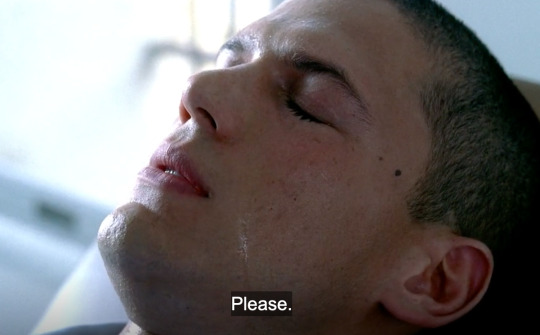
nobody compares not anyone at all
#pb lb#this show wouldnt work w/o him which is true because he's beautiful and i wouldnt be as willing to watch otherwise but also#because he's beautiful and it makes his role within the story different for that beauty#also he's a good actor honestly its hard for me to think of a world without him as michael#but IG even in that world this show does have merit on its own or smth 🙄 or whatever
1 note
·
View note
Text
so it looks like the (largely American and Canadian) Hugo awards administration team for 2023 was compiling political dossiers on nominees to determine whether they should be disqualified as finalists. which is infuriating for all sorts of ideological reasons, but also the dossiers aren't even good. so much of what supposedly disqualified these nominees was half-remembered, or based on hearsay, or just outright wrong. like look at this shit:

i'm not the world's biggest Iron Widow fan, but Zhao's work deserved to win or lose on its own merits. not because someone on a committee who clearly hadn't read the book, who didn't remember the title, and who couldn't even spell their name right got scared of the deep state and put them on a blacklist.
2K notes
·
View notes
Text
Company that makes millions spying on students will get to sue a whistleblower

Yesterday, the Court of Appeal for British Columbia handed down a jaw-droppingly stupid and terrible decision, rejecting the whistleblower Ian Linkletter’s claim that he was engaged in legitimate criticism when he linked to freely available materials from the ed-tech surveillance company Proctorio:
https://www.bccourts.ca/jdb-txt/ca/23/01/2023BCCA0160.htm
If you’d like an essay-formatted version of this post to read or share, here’s a link to it on pluralistic.net, my surveillance-free, ad-free, tracker-free blog:
https://pluralistic.net/2023/04/20/links-arent-performances/#free-ian-linkletter
It’s been a minute since Linkletter’s case arose, so I’ll give you a little recap here. Proctorio is a massive, wildly profitable ed-tech company that sells a surveillance tool to monitor students while they take high-stakes tests from home. The tool monitors the student’s computer and the student’s face, especially their eye-movements. It also allows instructors and other personnel to watch the students and even take control of their computer. This is called “remote invigilation.”
This is ghastly in just about every way. For starters, Proctorio’s facial monitoring software embeds the usual racist problems with machine-learning stuff, and struggles to recognize Black and brown faces. Black children sitting exams under Proctorio’s gimlet eye have reported that the only way to satisfy Proctorio’s digital phrenology system is to work with multiple high-powered lights shining directly in their faces.
A Proctorio session typically begins with a student being forced to pan a webcam around their test-taking room. During lockdown, this meant that students who shared a room — for example, with a parent who worked night-shifts — would have to invade their family’s privacy, and might be disqualified because they couldn’t afford a place large enough to have private room in which to take their tests.
Proctorio’s tools also punish students for engaging in normal test-taking activity. Do you stare off into space when you’re trying through a problem? Bzzzt. Do you read questions aloud to yourself under your breath when you’re trying to understand their meanings? Bzzzt. Do you have IBS and need to go to the toilet? Bzzzt. The canon of remote invigilation horror stories is filled with accounts of students being forced to defecate themselves, or vomit down their shirts without turning their heads (because looking away is an automatically flagged offense).
The tragedy is that all of this is in service to the pedagogically bankrupt practice of high-stakes testing. Few pedagogists believe that the kind of exam that Proctorio seeks to recreate in students’ homes has real assessment merit. As the old saying goes, “Tests measure your ability to take tests.” But Proctorio doesn’t even measure your ability to take a test — it measures your ability to take a test with three bright lights shining directly on your face. Or while you are covered in your own feces and vomit. While you stare rigidly at a screen. While your tired mother who just worked 16 hours in a covid ward stands outside the door to your apartment.
The lockdown could have been an opportunity to improve educational assessment. There is a rich panoply of techniques that educators can adopt that deliver a far better picture of students’ learning, and work well for remote as well as in-person education. Instead, companies like Proctorio made vast fortunes, most of it from publicly funded institutions, by encouraging a worse-than-useless, discriminatory practice:
https://pluralistic.net/2021/06/24/proctor-ology/#miseducation
Proctorio clearly knows that its racket is brittle. Like any disaster profiteer, Proctorio will struggle to survive after the crisis passes and we awaken from our collective nightmare and ask ourselves why we were stampeded into using its terrible products. The company went to war against its critics.
In 2020, Proctorio CEO Mike Olsen doxed a child who complained about his company’s software in a Reddit forum:
https://pluralistic.net/2020/07/01/bossware/#moral-exemplar
In 2021, the reviews for Proctorio’s Chrome plugin all mysteriously vanished. Needless to say, these reviews — from students forced to use Proctorio’s spyware — were brutal:
https://pluralistic.net/2021/09/04/hypervigilance/#radical-transparency
Proctorio claims that it protects “educational integrity,” but its actions suggest a company far more concerned about the integrity of its own profits:
https://pluralistic.net/2022/02/16/unauthorized-paper/#cheating-anticheat
One of the critics that Proctorio attacked is Ian Linkletter. In 2020, Linkletter was a Learning Technology Specialist at UBC’s Faculty of Education. His job was to assess and support ed-tech tools, including Proctorio. In the course of that work, Linkletter reviewed Proctorio’s training material for educators, which are a bonanza of mask-off materials that are palpably contemptuous of students, who are presumed to be cheaters.
At the time, a debate over remote invigilation tools was raging through Canadian education circles, with students, teachers and parents fiercely arguing the merits and downsides of making surveillance the linchpin of assessment. Linkletter waded into this debate, tweeting a series of sharp criticisms of Proctorio. In these tweets, Linkletter linked to Proctorio’s unlisted, but publicly available, Youtube videos.
A note of explanation: Youtube videos can be flagged as “unlisted,” which means they don’t show up in searches. They can also be flagged as “private,” which means you have to be on a list of authorized users to see them. Proctorio made its training videos unlisted, but they weren’t private — they were visible to anyone who had a link to them.
Proctorio sued Linkletter for this. They argued that he had breached a duty of confidentiality, and that linking to these videos was a copyright violation:
https://pluralistic.net/2020/10/17/proctorio-v-linkletter/#proctorio
This is a classic SLAPP — a “strategic litigation against public participation.” That’s when a deep-pocketed, thin-skinned bully, like Proctorio, uses the threat of a long court battle to force their critics into silence. They know they can’t win their case, but that’s not the victory they’re seeking. They don’t want to win the case, they want to win the argument, by silencing a critic who would otherwise be bankrupted by legal fees.
Getting SLAPPed is no fun. I’ve been there. Just this year, a billionaire financier tried to force me into silence by threatening me with a lawsuit. Thankfully, Ken “Popehat” White was on the case, and he reminded this billionaire’s counsel that California has a strong anti-SLAPP law, and if Ken had to defend me in court, he could get a fortune in fees from the bully after he prevailed:
https://twitter.com/doctorow/status/1531684572479377409
British Columbia also has an anti-SLAPP law, but unlike California’s anti-SLAPP, the law is relatively new and untested. Still, Proctorio’s suit against Linkletter was such an obvious SLAPP that for many of us, it seemed likely that Linkletter would be able to defend himself from this American bully and its attempt to use Canada’s courts to silence a Canadian educator.
For Linkletter to use BC’s anti-SLAPP law, he would have to prove that he was weighing in on a matter of public interest, and that Proctorio’s copyright and confidentiality claims were nonsense, unlikely to prevail on their merits. If he could do that, he’d be able to get the case thrown out, without having to go through a lengthy, brutally expensive trial.
Incredibly, though, the lower court found against Linkletter. Naturally, Linkletter appealed. His “factotum” is a crystal clear document that sets out the serious errors of law and fact the lower court made:
https://drive.google.com/file/d/1aB1ztWDFr3MU6BsAMt6rWXOiXJ8sT3MY/view
But yesterday, the Court of Appeal upheld the lower court, repeating all of these gross errors and finding for Proctorio:
https://www.bccourts.ca/jdb-txt/ca/23/01/2023BCCA0160.htm
This judgment is grotesque. It makes a mockery of BC’s anti-SLAPP statute, to say nothing of Canadian copyright and confidentiality law. For starters, it finds that publishing a link can be a “performance” of a copyrighted work, which meant that when Linkletter linked to the world-viewable Youtube files that Proctorio had posted, he infringed on copyright.
This is a perverse, even surreal take on copyright. The court rejects Linkletter’s argument that even Youtube’s terms of service warned Proctorio that publishing world-viewable material on its site constituted permission for people to link to and watch that material.
But what about “fair dealing” (similar to fair use)? Linkletter argued that linking to a video that shows that Proctorio’s assurances to parents and students about its products’ benign nature were contradicted by the way it talked to educators was fair dealing. Fair dealing is a broad suite of limitations and exceptions to copyright for the purposes of commentary, criticism, study, satire, etc.
So even if linking is a copyright infringement (ugh, seriously?!), surely it’s fair dealing in this case. Proctorio was selling millions of dollars in software to public institutions, inflicting it on kids whose parents weren’t getting the whole story. Linkletter used Proctorio’s own words to rebut its assurances. What could be more fair dealing than that?
Not so fast, the appeals panel says: they say that Linkletter could have made his case just as well without linking to Proctorio’s materials. This is…bad. I mean, it’s also wrong, but it’s very bad, too. It’s wrong because an argument about what a company intends necessarily has to draw upon the company’s own statements. It’s absurd to say that Linkletter’s point would have been made equally well if he said “I disbelieve Proctorio’s public assurances because I’ve seen seekrit documents” as it was when he was able to link to those documents so that people could see them for themselves.
But it’s bad because it rips the heart out of the fair dealing exception for criticism. Publishing a link to a copyrighted work is the most minimal way to quote from it in a debate — Linkletter literally didn’t reproduce a single word, not a single letter, from Proctorio’s copyrighted works. If the court says, “Sure, you can quote from a work to criticize it, but only so much as you need to make your argument,” and then says, “But also, simply referencing a work without quoting it at all is taking too much,” then what reasonable person would ever try to rely on a fair dealing exemption for criticism?
Then there’s the confidentiality claim: in his submissions to the lower court and the appeals court, Linkletter pointed out that the “confidential” materials he’d linked to were available in many places online, and could be easily located with a Google search. Proctorio had uploaded these “confidential” materials to many sites — without flagging them as “unlisted” or “private.”
What’s more, the videos that Linkletter linked to were in found a “Help Center” that didn’t even have a terms-of-service condition that required confidentiality. How on Earth can materials that are publicly available all over the web be “confidential?”
Here, the court takes yet another bizarre turn in logic. They find that because a member of the public would have to “gather” the videos from “many sources,” that the collection of links was confidential, even if none of the links in the collection were confidential. Again, this is both wrong and bad.
Every investigator, every journalist, every critic, starts by looking in different places for information that can be combined to paint a coherent picture of what’s going on. This is the heart of “open source intelligence,” combing different sources for data points that shed light on one another.
The idea that “gathering” public information can breach confidentiality strikes directly at all investigative activity. Every day, every newspaper and news broadcast in Canada engages in this conduct. The appeals court has put them all in jeopardy with this terrible finding.
Finally, there’s the question of Proctorio’s security. Proctorio argued that by publishing links to its educator materials, Linkletter weakened the security of its products. That is, they claim that if students know how the invigilation tool works, it stops working. This is the very definition of “security through obscurity,” and it’s a practice that every serious infosec professional rejects. If Proctorio is telling the truth when it says that describing how its products work makes them stop working, then they make bad products that no one should pay money for.
The court absolutely flubs this one, too, accepting the claim of security through obscurity at face value. That’s a finding that flies in the face of all security research.
So what happens now? Well, Linkletter has lost his SLAPP claim, so nominally the case can proceed. Linkletter could appeal his case to Canada’s Supreme Court (about 7% of Supreme Court appeals of BC appeals court judgments get heard). Or Proctorio could drop the case. Or it could go to a full trial, where these outlandish ideas about copyright, confidentiality and information security would get a thorough — and blisteringly expensive — examination.
In Linkletter’s statement, he remains defiant and unwilling to give in to bullying, but says he’ll have to “carefully consider” his next step. That’s fair enough: there’s a lot on the line here:
https://linkletter.opened.ca/stand-against-proctorios-slapp-update-30/
Linkletter answers his supporters’ questions about how they can help with some excellent advice: “What I ask is for you to do what you can to protect students. Academic surveillance technology companies would like nothing more but for us all to shut up. Don’t let them silence you. Don’t let anyone or anything take away your human right to freedom of expression.”
Today (Apr 21), I’m speaking in Chicago at the Stigler Center’s Antitrust and Competition Conference. This weekend (Apr 22/23), I’m at the LA Times Festival of Books.
[Image ID: A girl working on a laptop. Her mouth has been taped shut. Glaring out of the laptop screen is the hostile red eye of HAL9000 from '2001: A Space Odyssey.' Behind them is a tattered, filthy, burned Canadian flag.]
Image:
Ingo Bernhardt
https://www.flickr.com/photos/spree2010/4930763550/
CC BY 2.0
https://creativecommons.org/licenses/by/2.0/
Cryteria (modified)
https://commons.wikimedia.org/wiki/File:HAL9000.svg
CC BY 3.0
https://creativecommons.org/licenses/by/3.0/deed.en
Eleanor Vladinsky (modified)
https://commons.wikimedia.org/wiki/File:Canadian_flag_against_grey_sky.jpg
CC BY 4.0
https://creativecommons.org/licenses/by-sa/4.0/deed.en
#pluralistic#security through obscurity#copyfight#education#cdnpoli#whistleblowers#pedagogy#canada#intimidation#corruption#slapp#ian linkletter#proctorio#censorship#remote invigilation
6K notes
·
View notes
Note
hi, i hope you dont mind me asking this question! i often come across lists of reading recommendations for communists, and they are usually focused entirely on communist theory. which is important and im already on that, but i wonder if you also have recs for learning about history? especially the history of the soviet union, but also other past and present socialist states. i sometimes find myself reading theory and understanding the concepts in a vacuum, but with very little understanding of the historical context they were written in, if that makes any sense. and id like to get a basic grasp of the history of various socialist projects that isnt just the typical western "the ussr was evil!!!!" thing
Hi, historical context is indeed very important for works of theory, especially if it's more than a hundred years old. Lenin's What is to be Done, for example, is very conditioned by its historical context of Russia still being predominantly feudal, with only a timid appearance of the proletariat in St. Petersburg and Moscow, and therefore the very first trade unions, which he talks about. The understanding of these texts is amplified, and quite often enabled by knowing at least the basic historical context. Below I'll list the historical works I've read (and others) with some commentary, but I encourage anyone who has something to add to do so, since I am as of only recently getting more into historiography.
Anything by Anna Louise Strong (I've read The Soviets Expected it (1941) and In North Korea (1941), there's also The New Lithuania (1941), The Stalin Era (1956) and When Serfs Stood Up in Tibet (1959) for example). Her works, which I'd consider primary sources since they are written from her own experience witnessing events and talking to a lot of people, are extremely useful if you wish to form an idea about how some aspects of socialist states worked. The limitation of her works also resides in this specificity and closeness, these are not works that present a broad view of long processes, but a slice of the present with the sufficient historical context. They are still very, very good.
The Open Veins of Latin America (Spanish versrion), by Eduardo Galeno (1971). This one is focused on the history of imperialism in Latin America, how it evolved from the moment the first Spanish foot touched ground to the time it was written in (It talks about Allende before he was assassinated but after achieving power, for example). Perhaps it's not exactly what you're looking for, but it contains very important general context for any social movement that has happened since 1492 to 1971
The Triumph of Evil, by Austin Murphy (2002). I have mixed feelings about this book. While it insists on this weird narrative of absolute evil, which IMO takes away a lot of value from the overall points made, it is an astonishingly in-depth analysis of the economic performance and general merit of socialist systems against their capitalist counterparts. Most of the book is dedicated to comparing the GDR to the FRG, and both the economic and social data it exposes was very eye-opening to me when I read it about 2 years ago. If you can wade through the moralism (especially the beginning of the introduction), it's a gem. I've posted pictures of its very detailed index under the cut :)
Blackshirts and Reds, Michael Parenti (1997). Despite the very real criticisms levied against this book, like its mischaracterization of China, it is still a landmark work. Synthetically, it exposes the relationship between fascism, capitalism and communism.
Red Star Over the Third World, Vijay Prashad (2019); The Russian Revolution: A View from the Third World, Walter Rodney (2018). I'm lumping these two together (full disclosure, as of writing I'm about four fifths of the way through RSOtTW) because they deal with the same topic, Prashad being influenced by Rodney as well. Like both titles imply, they deal with the effects the October revolution had on the exploited peoples of the world, which is a perspective that's often lost. Through this, they (at least Prashad) also talk about the early USSR and how it functioned. For example, up until reading Red Star, I hadn't even heard of the 1920 Congress of The Toilers of the East in Baku, or the Congress of the Women of the East.
From here on I'll link works that I haven't (yet) read, but I have seen enough trusted people talk about them to include them
How to Cast a God into Hell: The Khrushchev Report, by Domenico Losurdo (2008). This one talks about how the period of Stalin was twisted and exaggerated through destalinization.
Devils in Amber, by Philips Bonoski (1992). This is about the Baltics and their historical trajectory from before WW1 to the destruction of the USSR (I'm not very sure on those two limits, perhaps they fluctuate a bit, but it definitely covers from WW1 to the 60s)
Socialism Betrayed, by Roger Keeran and Thomas Kenny (2004). This one deals with the process leading up to and the destruction of the USSR itself.
The Jakarta Method, Vincent Bevins (2020). This is about the methods the US used in the second half of the 20th century to stamp out, prevent, or otherwise sabotage communist movements and other democratic anti-imperialist movements.
I know some of these aren't specifically about socialist states, which is what you asked, but the history of its opposition is just as important to understand because it always exists as a condition to these countries' development and policies chosen.



385 notes
·
View notes
Text
On "Consuming Content"
Every now and then a post crosses my feed that follows the vein of, "you have to do things other than consume media or else you'll be a dumb person who doesn't know anything about how the real world works and does nothing but pointless fandom stuff."
I hate those posts for three major reasons, not counting the inherent ableism and classism of "you must have approved Smart People hobbies or else you're worthless" rhetoric:
You don't know what people do or talk about outside of what you see on their social media. Responding to fandom communities on a fandom-driven website as if all these people are one-note cardboard cutouts of people is asinine. In many cases this genre of post feels like repackaged 2012 tumblr "not like other girls" and hipster discourse. Yes, yes, you think you're better than everyone else on this website because your hobbies are less mainstream, more morally pure, and have greater intellectual merit, we get it.
What do you even mean by consuming content? As someone who purposely avoids using the phrase "consuming content" because I find the term too vague to be useful, please be more specific. Are you including every single form of media engagement and art enjoyment? Are you just talking about mainstream TV and film? What about novels? Plays and scripts? Nonfiction books and instruction manuals? Do you mean to imply that going to a book club is a worthless non-hobby? Are you including academic reading? Are you including going to the art museum? Going to the theatre, concerts, or other performances? Taped liveshows? Watching sports events on TV? Are you including news media? Are you including YouTube tutorials about how to do various tasks, crafts, or other hobbies? Are you including trade magazines? Are you including industry publications in various fields? What constitutes "content," and what constitutes "consuming" in this discourse? Define it. "Consuming content" is a nothing phrase that people use to mean multiple different things depending on what they, personally, judge as valid media. It's a buzzword at best, and when the same buzzword can be used to describe both "idly scrolling social media" and "reading and discussing a book," it's a meaningless phrase.
As an artist and author, if engaging with media is bad and worthless, am I supposed to conclude that making it is equally worthless? If "consuming content" is a bad, lazy, worthless, fake hobby, what makes creating art a worthwhile pursuit? If I am constantly being told as an artist that engaging with media isn't a worthwhile pursuit in its own right, and the people who want to engage with my art are just brainless fandom losers, what incentive do I have to make that art anymore? Furthermore, to everyone reading this paragraph and thinking, "that's not what content creation is," I refer you to bullet #2: If the phrase "make content" can be used to mean "low-effort posts made to advertise cheap and useless products" as well as "being a novelist" or "getting a gig as a writer on a TV show," it's a meaningless phrase.
None of that is even getting into issues such as the way influencers are preyed on by both brands and targeted harassment from trolls. Influencer culture has major issues, but boiling those issues down to "stupid vapid young people who are too lazy to make real art or get real jobs" (which is a mindset I see frequently online) is unhelpful. So many people pursue influencer deals because they're living in poverty but are skilled at various social media and advertising related tasks, and just like any worker, they're being exploited because they need to eat. Labor rights for influencers are a huge topic that entertainment industry unions have been actively discussing and working toward. (Related links for further info: [x] [x] [x] [x])
"Consuming content is not a hobby" is a worthless statement unless you define what you mean by both "consuming" and "content." Quite frankly, you also need to define "hobby," because if you're putting requirements on what is and isn't allowed to be a "real" hobby, you mostly just seem like you're moving goalposts and defining "worthwhile hobby" as "hobby I, personally, think is good." Use more specific language to articulate your actual problems with the entertainment industry, the art world, influencer culture, or whatever else you're actually upset by.
Media and fandom can involve any number of enriching, satisfying hobbies that take up a perfectly acceptable and healthy space in someone's life. If you aren't into it, go find hobbies you do like and stop policing how other people spend their precious free time in this nightmare hellscape of a world.
445 notes
·
View notes